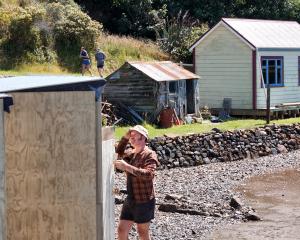
New Zealand is incredible and the Otago region mind-blowing, but let’s not pretend we’re living in Utopia.
New Zealand is a lucky country in many ways; its geographical isolation, its soils, rivers, wilderness, coastline.
There is little population pressure on vast expanses of land, yet we still have major environmental issues.
We are testing our environment’s ability to cope and can’t ignore the big-picture problems.
The Paris agreement on slowing global warming provided some hope that issue at least would be addressed, but little or no action is being taken by our government or governments elsewhere.

We can change the footprint we make on New Zealand and the rest of the world: thinking globally by acting locally.
Of course there’s a list of changes you can make; electric cars, solar hot water, energy-saving lights, insulation, organic and locally grown food, being conscious of where you spend hard-earned dollars, and so on.
A place to find soulful connection and fulfilment is in our backyards and community gardens.
We don’t even have to be growing food, just sitting and observing nature.
You don’t need to go bush for a nature fix.
Take it another step or two and you’re composting and growing veges. I’m currently reading Farmers of Forty Centuries.
As author Franklin Hiram King walks the roads of rural China in 1907, he can’t help but notice the roadside toilets next to farmers’ fields.
They are available for your convenience as you travel, your daily movements in high demand as a valuable fertilising resource.
The same was true for coastal cities’ ablutions. Instead of flushing all that "human manure’’ out to sea, it was seen as a resource with a high dollar value.
This is only going back 100 years.
Right here in New Zealand there is a long history of using all available "waste" nutrients in gardening and agriculture.
You can still visit the toilet next to Arrowtown’s gold-mining era market garden.
The point here isn’t to get a bucket and collect your own (that’s a can of worms for another time).
It’s that there are valuable nutrient resources staring us in the face every day that we can harness and use for little or no cost to make our little bit of dirt a little more like paradise.
When we put garden prunings and food scraps in the rubbish, we’re wasting all these organic nutrients. It’s time to put a value on them.
At the same time, keeping garden and kitchen waste out of the rubbish means our landfills will produce less methane, a greenhouse gas.
If you don’t have your own garden, you just need a compost system and a willing recipient for all that nutrient goodness.
Maybe you have a gardener friend who will give you some surplus veges from time to time as an incentive to keep going.
Bokashi bucket composting is a system that would suit this.
The bucket doesn’t smell when done correctly, and you can hand over the bucket of goodies once it’s ready, and do it all again.
I have a few friends who have tapped into our national coffee addiction, collecting spent coffee grounds on a weekly basis from a couple of local cafes.
You’d be amazed at the quantity of spent coffee grounds a busy cafe produces.
The high nitrogen content along with some magnesium and potassium means we can add these grounds directly to the soil or into the compost heap as a green/nitrogen-rich ingredient.
With its fairly neutral pH, coffee grounds are not going to put your soil out of whack.
Some studies suggest using coffee grounds as a slug and snail repellent, which I’ll have to try.
With the right attitude, one person’s waste can become another person’s gold.
Imagine having to buy those coffee grounds, imagine a place where all organic waste has a dollar value.
Right now there are individuals and businesses which can’t give it away.
Just 100 years ago it was a very different story.
- Dr Compost workshops are funded by Queenstown Lakes District Council to reduce food and garden waste going to the landfill.
Get composting
Can you extend your composting powers to take a friend’s organic waste?Why not approach local businesses to see what they’re doing with their food waste?Put a Bokashi bucket in the office canteen and see who’s first to take it home when it’s full. I know of canteens where if you snooze you lose, such is the competition to take the full bucket home.
Events
Dr Compost will have a stall at Wanaka Springfest (Sunday, October 23, 10am-1pm at Pembroke Park) and Queenstown Ecofair (Sunday, October 30, outside Queenstown Events Centre). Bring your composting and gardening questions for a personal composting prescription to suit you.
Workshops
Wanaka
Venue: St John room, 4 Link Way.
Thursday October 20, 6-8pm Growing vegetables.
How to make a raised bed and grow the best veges in town: top crops, local tips, seeds.
Wednesday October 26, 6-8pm Lazy ways to compost. Harness the power of worms, fermentation and microbes: Bokashi, trench compost, worms.
Queenstown
Venue: Shotover Garden Centre, 150 Frankton Ladies-Mile Highway.
Thursday October 27, 6-8pm Growing vegetables.
Thursday November 3, 6-8pm Lazy ways to compost.











